The Meath Foxhounds and Tara Hunt are holding their Autumn fixture at Dowth Hall on Sunday 25th October.
The track was previously used in the 1860's, it has a fantastic setting along the Boyne in County Meath.
Below is a background history of the Racecourse at Dowth.
The Racecourse at Dowth
Given the relationship between the horse and the country house, the creation of racecourses within the demesne landscape is not unusual with other historic examples found at Cabra Castle, near Kingscourt in Cavan and Chapelizod House in Kilkenny. The racecourse forms an integral part of the historic demesne associated with Dowth Hall, remaining a prominent landscape feature in the north east portion of the demense, where it adopts a sub-triangular shape, formally laid out with a treelined peripheral track and divided by axial avenues that intersected in a central diamond, perhaps representing the finishing post.
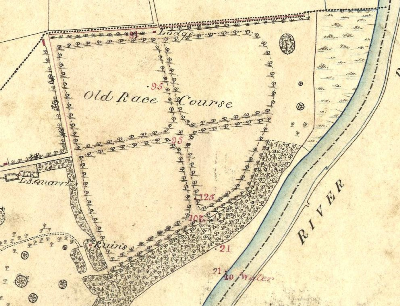
The Old Race Course at Dowth Hall from the Ordnance Survey Fair Plan, 1836
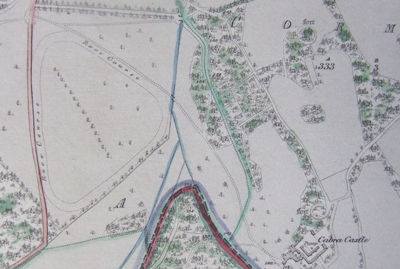
Racecourse at Cabra Castle Kingscourt 1830s
Already described as old in 1836, the race course at Dowth is likely to have been part of the extensive improvements carried out by the 5th Viscount Netterville in the early eighteenth century, works that included the creation of the adjacent ‘great avenue’ (the Drogheda Road). It appears that the race course was always utilised as part of the main approach to Dowth Hall, the main carriage drive brought through the main north-south axis.
After the death of the 6th Viscount Netterville in 1826, Dowth Hall passed to his nephew, Andrew Blake. Thereafter the demesne entered a period of decline and relative dereliction, so that eventually burdened with debt the property was eventually sold by John Netterville Blake in 1851. It was purchased by Richard Gradwell whose family originated in Lancashire but who had established Irish connections. Gradwell was an improving owner of the demesne who modernised and extended the house and added several new buildings including a new stableyard.
The building of new stables at Dowth naturally emanated from Richard Gradwell’s interest in horses, an interest widely shared among other family members, and among the landed gentry generally, but at Dowth it reflects a particular keenness that is more clearly demonstrated by the revival of horse racing on the property. The earliest indication for this can be found in 1867 when in March the ‘Drogheda and Dowth Drag Hunt’ was reported in the Dublin Evening Post. In April The Irish Times reported on the races which included The Dowth Stakes, run over a course of about three miles. According to the paper the ‘Dowth Hunt & Steeplechase’ held on 1 April (where “a capital day’s sport came off...over the Dowth course”) was “numerously and fashionably attended” by the best of society; among those in attendance were the Marquess Conyngham, Sir Percy Nugent, and Lord Masserene. Later the same year, in May, the Dowth Hunt and Steeplechases were advertised in the Irish Racing Book and Sheet Calendar and further fixtures were announced for the same period in the following years, until 1870, though it remains unclear whether there were further events in later years.
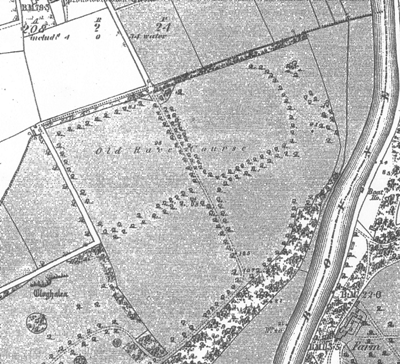
Dowth Racecourse from the revised Ordnance Survey 1882
The Gradwells remained in possession of Dowth for exactly a century. Richard Gradwell was succeeded in 1882 by his only son, Robert, a captain in the Royal Meath Militia who in 1884 married Lady Henrietta Plunkett, the younger daugher of 10th Earl of Fingall. After Robert Gradwell’s death in 1935, Dowth was bequeathed to a cousin, Francis Gradwell, the youngest son of George Gradwell of Platten Hall.
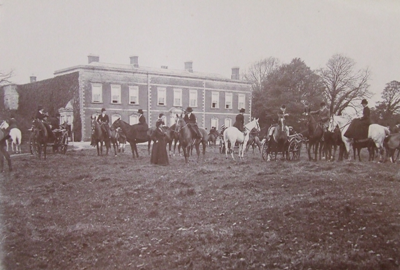
Platten Hall in the late nineteenth century
The Gradwell family’s keen interest in horse racing and breeding was demonstrated by the success of George Gradwell, nephew of Richard Gradwell of Dowth. George Gradwell’s stud enterprise, based at Platten Hall and Knockbrack (near Oldcastle), found noted success with ‘Drogheda’, a horse whose success culminated with winning the Grand National in 1898. By then the horse had been sold to a Mr. Adams, and was trained by Richard Dawson, also trainer of three Derby winners - Fifenella, Trigo & Blenheim. The jockey, John Gourley, apparently finished the race looking like a mounted snowman; Adam’s showed his gratitude by awarding the jockey a pension for life.
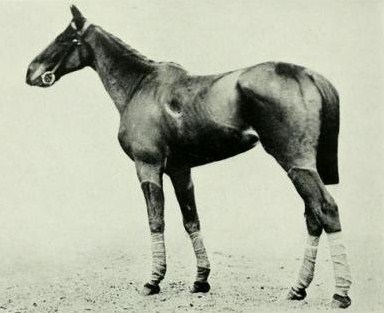
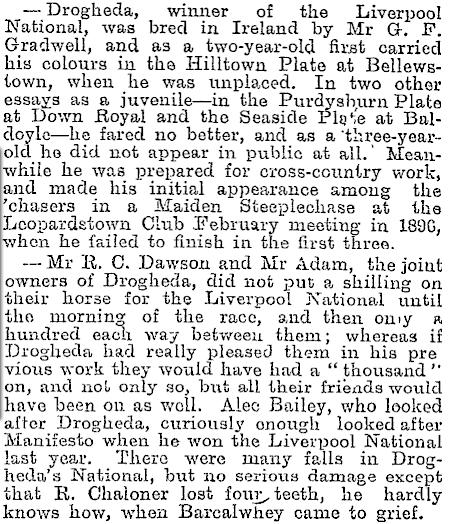
‘Drogheda’ winner of the 1898 Grand National, Newspaper cutting reporting on 1898 win
bred by George Gradwell
Further background to ‘Drogheda’ and his connection to the Gradwells is found in the following letter to the Drogheda Independent in 1951:
Dear Sir - As a regular reader of your paper I was very surprised to read in PC's column of last week's edition that he referred to the famous racehorse, 'Drogheda' and that it was 'first spotted by Mr Gradwell when drawing a hackney car through the town in a most spirited manner'. As one who lived in Mr George Gradwell`s training establishment at Knockbrack for a number of years and who, as an apprentice, had the honour of looking after this great racehorse, I wish to contradict this statement.
The horse 'Drogheda' first saw the light of day on January 4th 1892 at Knockbrack; I myself being present at the birth, at 2am on that morning. His sire was 'Cherry Ripe', out of 'Eglantine' herself won many important races including the Irish Grand National.
'Drogheda's' first race was at Bellewstown as a two-year-old in the Hilltown Plate and was ridden by W Wynn, an apprentice in Gradwell`s stables. His next race as a two-year old was at the Maze in the Purdsburn Plate, the jockey being John Doyle. He did not race again until he was four years old, when he won the Dunboyne Plate at Fairyhouse. His next race was at baldoyle in the Dublin Plate which he won from a field of 21 in a canter; his jockey being the then famous Tommy Dowdall. His next race was the Grand-Stand-Chase at Bellewstown, which he won very easily with the same jockey.
His next race was the Galway Plate in August which he again won easily by four lengths from a field of 27. He was then sold by Mr Gradwell in September for a very large sum of money to a Mr Adams and was trained then by a Mr RC Dawson at Wyhatcombe in England. The following March (1898) he, as a six-year-old, won the Grand National race at Liverpool, which was run in a blinding snowstorm, his jockey being that great horseman John Gurley; his time was record one at the time finishing the race in 9 minutes and 42 seconds. John Gurley told me afterwards, that when he gave 'Drogheda' his head after jumping the last fence and when the crowd started to cheer him home, he ('Drogheda') started to run away and he ran a quarter of a mile before he could pull him up.
The starting price was 25 to 1 owing, no doubt, to the fact that all the racing scribes of the day declared that he had no chance and might as well be kept in his stable for he could not stay the distance. The truth of course was that 'Drogheda' could stay for six miles if necessary, the last mile being faster than the first.
The following year (1899) he was favourite for the Grand National, when unfortunately the night before the race he met with a serious accident in his box and had to be withdrawn. I have no doubt in my mind but that he would have again won this race. His jumping was superb and he never made a mistake of fell jumping in his life.
These days we hear a lot about the difficulties of Liverpool racecourse, but it must be remembered that in those days (1898) the fences were much higher and stiffer than they are today. Yet most of the horses that started then, finished the course.
In my opinion the greatest horse to win it was 'Drogheda'.
Yours, Francis Brannigan, 5 St Aidan's Park, Fairview

